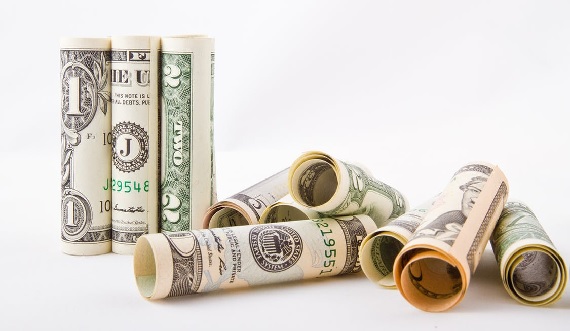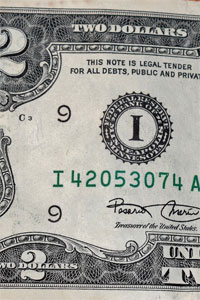
In the last three posts, I bought Bitcoin, discovered how it is stored, and even went to Iceland to find out where they come from. (Fact check: That is not why I went to Iceland.)
Over and over again in these posts I would refer to Bitcoin as “money.” And over and over again I had to correct myself. Keeping “Bitcoin” separate from the idea of “money” is surprisingly hard.
Let’s be clear: Bitcoin is not money.
In other news, Bitcoin is money.
Bitcoin is not Money
This is not my opinion, it is a matter of law.
In 2014, the IRS officially classified bitcoins as physical property—they would only be taxed when sold. In 2015, the Commodities and Futures Trading Commission defined bitcoin and other virtual currencies as “commodities.” In 2016, case law was made when a Florida judge threw out a money laundering charge involving a Bitcoin seller. Her ruling was that Bitcoin is not money, so it can’t be used for money laundering.

Basically, “money” requires one thing: backing. Money has to either be backed by the inherent value of the precious metal from which it is made (e.g. a gold coin), the promise of the bank issuing the money (e.g. checks and gold certificates), or a government (e.g. dollar bills).
Bitcoin is not money in the United States because it does not have the status of legal tender. All bills include the phrase, “this note is legal tender for all debts, public and private.” Legal tender is a form of payment recognized by law that must be accepted by a creditor.
Bitcoin is not made of precious metal (indeed, it isn’t made of anything), it is not backed by a bank or the promise of gold, and it is not backed by the government. Therefore Bitcoin is not Money. QED.
But…
Bitcoin is Money
Our experience with money is that it is something you have and carry around and use to buy things. And while our parents’ idea of money was coins and paper, most of us are totally fine thinking of money as a plastic and bits and bytes.
Bitcoin is something you can have and carry around and buy things with. (Ok, you can’t buy everything with Bitcoin, but you also can’t buy everything with a Discover or American Express card.) You can use Bitcoin to buy:
- anything from Overstock.com
- a hotel room from Expedia
- TV service from Dish
- a ride from a pedicab driver in Salt Lake City
and the list grows everyday.
Common sense says that Bitcoin is money. So does the dictionary:
something generally accepted as a medium of exchange, a measure of value, or a means of payment — Miriam Webster Dictionary
This clearly describes Bitcoin.
Bitcoin is not Money—It’s Better
While the economists, bureaucrats, and philosophers argue to put Bitcoin into a box marked “money” or to put it in a box marked “not money,” users are happy to ignore the question altogether. Ask a Bitcoin evangelist and he’ll just point out how much better Bitcoin is at being money than money itself is:
- Money should be portable. Bitcoin weighs nothing, takes up no space, can be moved across the world in seconds, and can be carried across borders in unlimited quantities. (Note: many people think this is too portable.)
- Money should be divisible. Have you ever been on a trip and wanted to buy a Coke but discovered that your smallest bill was a fifty? Bitcoins are divisible to six decimal places, so there is always change. And all transactions are all handled by a computer, so they never do the math wrong, give your the wrong change, or roll their eyes.
- Money should be durable. We use money to store value, but paper bills can burn, coins can be lost or run over by a train (don’t pretend you’ve never put a coin on the tracks) and all physical money wears out. Bitcoins are stored forever on the blockchain, which exists in millions of copies around the world. (Note: Bitcoin prices are ridiculously volatile so it may not be the best place to store value.)
- Money should be scarce. Examples of inflation caused by governments printing money are legion. The amount of bitcoins is fixed by the computer algorithm and there will never be more than 21 million minted.
- Money should be fungible. I thought that fungibility had something to do with mushrooms (I am a little obsessed with portabello sandwiches), but it actually describes things that can be replaced by other things. A dollar bill should be replaceable with any other dollar bill; and generally they are except when counterfeiting occurs. Each bitcoin on the blockchain is unique and can be inspected by the public; it cannot be counterfeited.
Bitcoin is not Money—It’s International
I always enjoyed going abroad and changing my real American dollars for the colorful Monopoly money of Canada or Mexico. The currency exchange booths showed a signs with a dozen or so currencies:
USD – United States Dollar
ISK – Iceland Krona
AUD – Australia Dollar
JPY – Japan Yen
MXN – Mexico Peso
Each currency code starts with the letter of the country backing it. One sign you won’t see at the currency booth: XBT — Bitcoin.
Exchanging currencies is part of the money experience, and because no country backs Bitcoin, there is no need to change it. I can use the coins put in my wallet in Utah to buy a portabello mushroom sandwich from Roast of Sherwood in London, which recently started taking Bitcoin.
But I’ll have to remind myself as I’m paying for my sandwich that Bitcoin is not money.